动名词做主语和宾语
- 格式:docx
- 大小:23.53 KB
- 文档页数:3

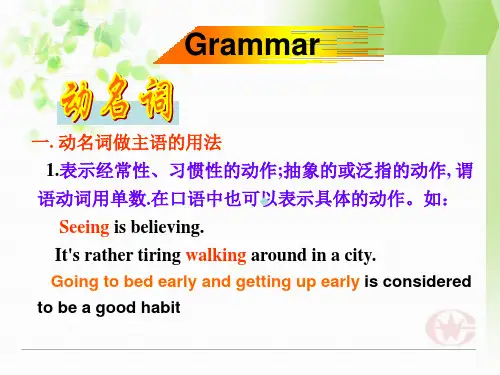
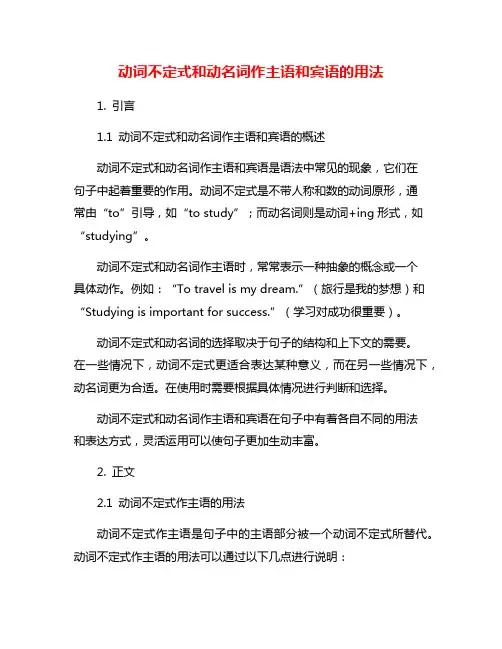
动词不定式和动名词作主语和宾语的用法1. 引言1.1 动词不定式和动名词作主语和宾语的概述动词不定式和动名词作主语和宾语是语法中常见的现象,它们在句子中起着重要的作用。
动词不定式是不带人称和数的动词原形,通常由“to”引导,如“to study”;而动名词则是动词+ing形式,如“studying”。
动词不定式和动名词作主语时,常常表示一种抽象的概念或一个具体动作。
例如:“To travel is my dream.”(旅行是我的梦想)和“Studying is important for success.”(学习对成功很重要)。
动词不定式和动名词的选择取决于句子的结构和上下文的需要。
在一些情况下,动词不定式更适合表达某种意义,而在另一些情况下,动名词更为合适。
在使用时需要根据具体情况进行判断和选择。
动词不定式和动名词作主语和宾语在句子中有着各自不同的用法和表达方式,灵活运用可以使句子更加生动丰富。
2. 正文2.1 动词不定式作主语的用法动词不定式作主语是句子中的主语部分被一个动词不定式所替代。
动词不定式作主语的用法可以通过以下几点进行说明:1. 表示一种行为或动作的意图或目的。
例如:"学习是成功的关键。
"2. 表示一种抽象的概念或观念。
例如:"帮助他人是一种美德。
"3. 在句子中作为主语时,通常放在句首位置。
例如:"抽烟会影响健康。
"4. 动词不定式作主语时,动词不定式通常是不带to的形式。
例如:"去旅行是我的梦想。
"5. 在某些情况下,动词不定式作主语时可以使用to的形式。
例如:"To learn a new language is challenging."动词不定式作主语可以使句子更加简洁明了,同时也可以突出所表达的意思或观点。
在写作中,我们可以适当运用动词不定式作主语来丰富句子结构,提高文章的表达力和逻辑性。
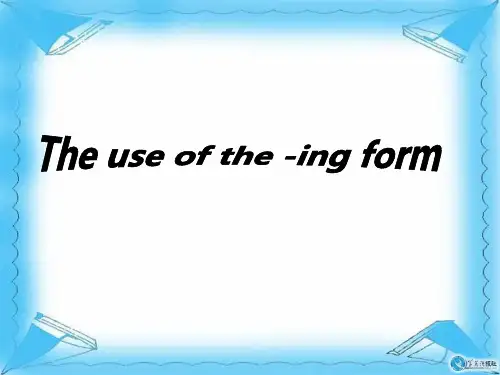



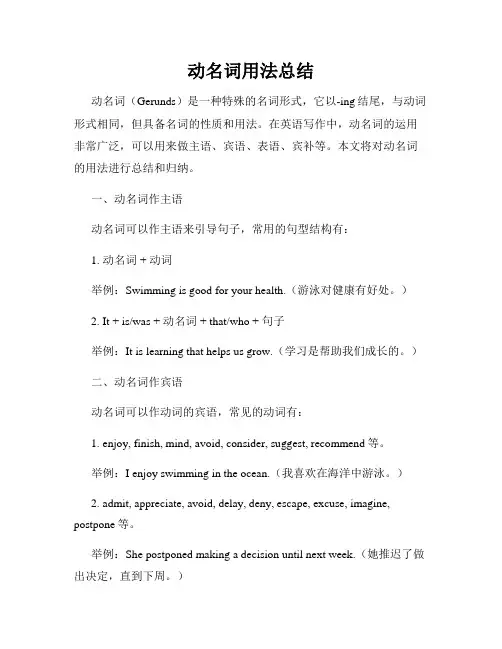
动名词用法总结动名词(Gerunds)是一种特殊的名词形式,它以-ing结尾,与动词形式相同,但具备名词的性质和用法。
在英语写作中,动名词的运用非常广泛,可以用来做主语、宾语、表语、宾补等。
本文将对动名词的用法进行总结和归纳。
一、动名词作主语动名词可以作主语来引导句子,常用的句型结构有:1. 动名词 + 动词举例:Swimming is good for your health.(游泳对健康有好处。
)2. It + is/was + 动名词 + that/who + 句子举例:It is learning that helps us grow.(学习是帮助我们成长的。
)二、动名词作宾语动名词可以作动词的宾语,常见的动词有:1. enjoy, finish, mind, avoid, consider, suggest, recommend等。
举例:I enjoy swimming in the ocean.(我喜欢在海洋中游泳。
)2. admit, appreciate, avoid, delay, deny, escape, excuse, imagine, postpone等。
举例:She postponed making a decision until next week.(她推迟了做出决定,直到下周。
)三、动名词作表语动名词可以作表语,常与be动词连用,表示主语的特征或状态。
举例:Her hobby is painting.(她的爱好是绘画。
)举例:My dream is traveling around the world.(我的梦想是环游世界。
)四、动名词作宾补在某些动词后面,可以加上动名词作宾补来表示动作的完整性。
常见的动词有:see, watch, hear, feel, notice, observe等。
举例:I saw him crossing the street.(我看到他穿过马路。
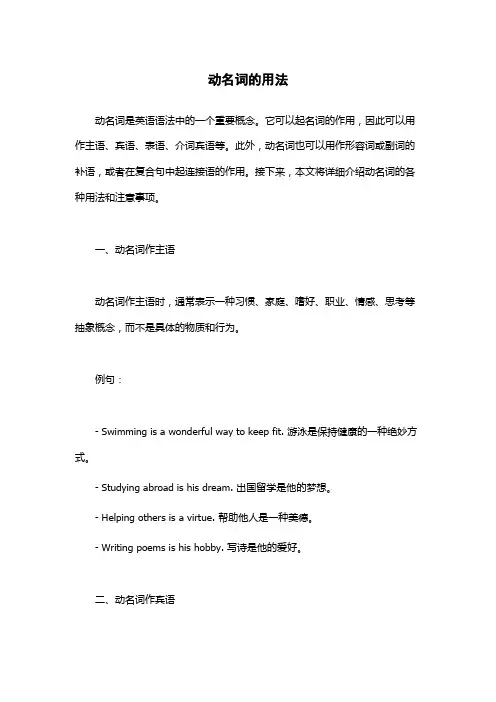
动名词的用法动名词是英语语法中的一个重要概念。
它可以起名词的作用,因此可以用作主语、宾语、表语、介词宾语等。
此外,动名词也可以用作形容词或副词的补语,或者在复合句中起连接语的作用。
接下来,本文将详细介绍动名词的各种用法和注意事项。
一、动名词作主语动名词作主语时,通常表示一种习惯、家庭、嗜好、职业、情感、思考等抽象概念,而不是具体的物质和行为。
例句:- Swimming is a wonderful way to keep fit. 游泳是保持健康的一种绝妙方式。
- Studying abroad is his dream. 出国留学是他的梦想。
- Helping others is a virtue. 帮助他人是一种美德。
- Writing poems is his hobby. 写诗是他的爱好。
二、动名词作宾语动名词作宾语时,通常表示一种行为、活动、计划等。
常见的动词包括admit, appreciate, avoid, postpone, practice等。
例句:- I enjoy reading books. 我喜欢读书。
- He avoids speaking in public. 他避免在公众场合讲话。
- The company is considering expanding overseas. 公司正在考虑扩展海外市场。
- She decided to postpone her wedding. 她决定推迟婚礼。
三、动名词作表语动名词作表语时,通常表示一种状态或特点。
常见的动词包括 be, become, seem, feel等。
例句:- Her favorite leisure activity is swimming. 她最喜欢的休闲活动是游泳。
- The idea of traveling alone seemed daunting to him. 独自旅行的想法对他来说看起来很艰巨。
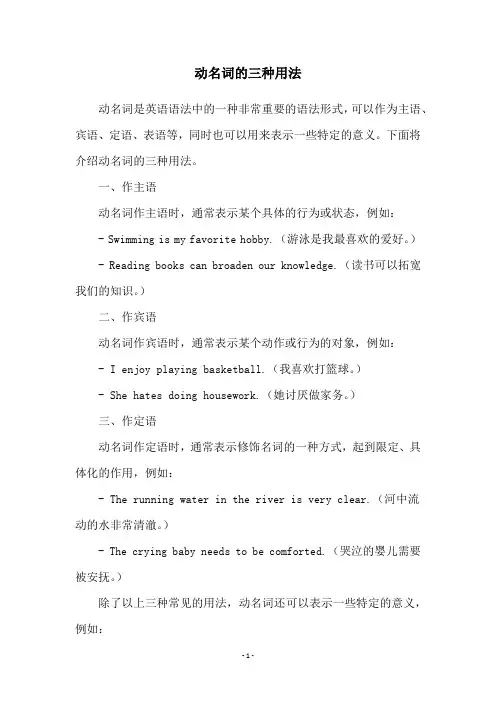
动名词的三种用法动名词是英语语法中的一种非常重要的语法形式,可以作为主语、宾语、定语、表语等,同时也可以用来表示一些特定的意义。
下面将介绍动名词的三种用法。
一、作主语动名词作主语时,通常表示某个具体的行为或状态,例如:- Swimming is my favorite hobby.(游泳是我最喜欢的爱好。
) - Reading books can broaden our knowledge.(读书可以拓宽我们的知识。
)二、作宾语动名词作宾语时,通常表示某个动作或行为的对象,例如:- I enjoy playing basketball.(我喜欢打篮球。
)- She hates doing housework.(她讨厌做家务。
)三、作定语动名词作定语时,通常表示修饰名词的一种方式,起到限定、具体化的作用,例如:- The running water in the river is very clear.(河中流动的水非常清澈。
)- The crying baby needs to be comforted.(哭泣的婴儿需要被安抚。
)除了以上三种常见的用法,动名词还可以表示一些特定的意义,例如:- V-ing + V-ed:表示同时或顺序进行的两个动作,如:He sat there, reading a book and drinking tea.(他坐在那里,一边看书一边喝茶。
)- V-ing + to-inf:表示动作的目的,如:He went there, hoping to meet his friend.(他去那里,希望能见到他的朋友。
)- V-ing + V-ing:表示两个动作同时进行,如:She was walking down the street, humming a song.(她一边走在街上,一边哼着歌。
)总之,动名词的用法非常丰富多样,对于英语学习者来说,掌握好动名词的使用,能够更加流利自如地表达自己的意思。
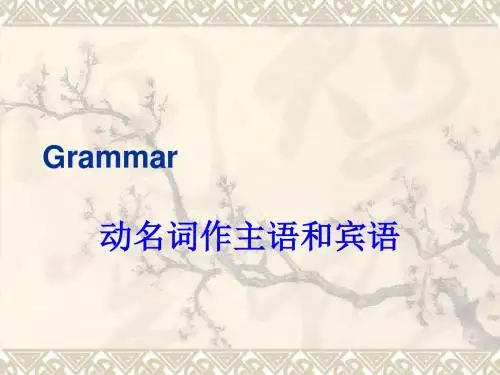
动名词作主语、宾语和表语1)作主语Fighting broke out between the South and the North.南方与北方开战了。
2)作宾语a. 动词后加动名词doing作宾语V. + doing sthadmit 承认appreciate 感激,赞赏avoid 避免complete 完成consider 认为delay 耽误deny 否认detest 讨厌endure 忍受enjoy 喜欢escape 逃脱prevent阻止fancy 想象finish 完成imagine 想象mind 介意miss 想念postpone 推迟practise 训练recall 回忆resent 讨厌resist 抵抗resume 继续risk 冒险suggest 建议face 面对include 包括stand 忍受understand 理解forgive 宽恕keep 继续举例:(1)Would you mind turning down your radio a little, please?(2)The squirrel was lucky that it just missed being caught.b. 词组后接doingadmit to prefer…to be used to lead to devote oneself to object to stick to be busy look forward to to为介词)no good,no use,It's worth…,as well as,can't help,It's no use /good be tired ofbe fond of be capable of be afraid ofbe proud of think of / about hold offput off keep on insist on count on / uponset about be successful in good at take upgive up burst out prevent … from…3)作表语Her job is washing,cleaning and taking care of the children.。
必修4 Unit 2 Working the land
编制:李小艳审定:高一英语备课
Period 5 动名词做主语和宾语
每日赠言:He who does not rise early never does a good day’s work.
学习目标:Students are able to understand the usage of doing as subject and object.
预习案:
1) The parents suggested ____ in the hotel room but their kids were anxious to camp out during the trip.
A. sleep
B. to sleep
C. sleeping
D. having slept
2)How I regret ___ so much time in the net bar! I should have studied harder.
A. to waste
B. wasting
C. wasted
D. being wasted
3) We should often practise ___ English with each other.
A. to speak
B. spoke
C. speak
D. speaking
4)Keep on ____ and you will succeed.
A. a try
B. try
C. triing
D. Trying
5)His parents insist on ___ to college.
A. he should go
B. he go
C. his going
D. him to go
探究案:
动词的 -ing 形式可分为动名词和现在分词两类。
作为动名词,它有名词的基本性质,因此动名词可以在句子中充当主语、宾语、表语,宾语补足语和定语。
本单元学习动名词做主语和宾语。
1.动名词做主语(动名词做主语往往表示经常性、习惯性的动作。
此时,谓语动词用单数形式)
动名词做主语有三种形式:
①动名词在句首直接做主语② It 在句首做形式主语,而动名词短语在后面做真正的逻辑上的主语③There be + no + 动名词
1)形式一动名词在句首直接做主语。
例如:
Reading aloud is very important for us to learn a foreign language.
(collect) stamps is his hobby.
Wishing for things,however, costs nothing.
2)It 在句首做形式主语,而动名词在后面做真正的逻辑上的主语。
例如
Going to bed early and getting up early is considered to be a good habit.
It is considered to be a good habit going to bed early and getting up early.
用下划线画出下面句子的形式主语和真正的主语
①It was a waste of time reading that book.
①It is dangerous standing in the middle of the street.
①Is it worthwhile quarrelling with her?
3)There be + no + 动名词。
例如:
There was no knowing what he could do.
There is no (joke) about such matters.
2.动名词做宾语
动名词做宾语的六种情形:
①作及物动词宾语②it 作形式宾语,代替动名词作③作动词词组的宾语④介词的宾语
⑤既可接doing 又可接to do 的动词,但意义不同⑥常接动名词的动词或动词短语
1)作及物动词宾语。
例如:
Would you mind___________(open) the window?
The girl practises __________(play)violin every evening.
2)作介词宾语。
例如:
Since then, he has devoted his life to ________(find)ways to grow more and more rice.
He always thinks much before __________(do)anything.
3)it 作形式宾语,代替动名词。
例如:
I found it pleasant_________(walk) along the river after supper.
Do you consider it necessary _________(try)again?
We look forward to (study )in university.
4)接doing的动词:
want, wish, hope, ask, help, refuse, learn, demand, choose, decide, plan, manage, pretend, afford ......
5)接doing 又可接to do 的动词:
A 意义基本一样,如like, love, hate, begin, start, prefer, attempt
B 意义明显不一样,如remember, forget, regret, mean, stop, try, want, need
例如:I forget to take the medicine. 译:_____________________
I forget taking the medicine. 译:_____________________
He didn’t mean to hurt you. 译:______________________
He didn’t mean hurting you. 译:______________________
6)常接动名词的动词或动词短语
A. 常跟动词ing作宾语的动词歌诀:
考虑建议盼原谅,consider, suggest,advise ,look forward to ,excuse ,pardon
承认推迟没得想,admit, delay , put off , fancy
避免错过继续练,avoid , miss ,keep, keep on , practise
否认完成停能赏,deny , finish , stop ,enjoy , appreciate
不禁介意准逃亡,can’t help , mind , allow, permit ,escape
不准冒险凭想象。
forbid , risk , imagine
B. 短语有:can’t help, be used to, end up, feel like, lead to, be busy, be tired of, be fond of, be afraid of, be proud of, think of / about, put off, keep on, insist on, be good at, give up
4) 人称代词宾格+动名词:him writing
1. _____________ ( read)in the library is a bad habit. 在图书馆大声阅读是一种不好的习惯
2. It’s no use __________ (talk). 像这样谈话是徒劳无用的。
3.I ________ (regret) not having worn a thicker coat yesterday.我很后悔昨天我没有穿一件厚点的外套。
3.
4.In my mind, __________ ________ (attend ) will be the only way to become a world-class writer. 在我看来,进入那所著名的大学学习是成为世界顶尖作家的唯一方法。